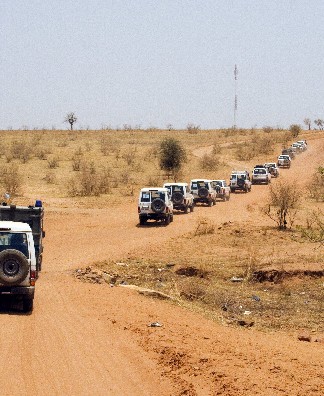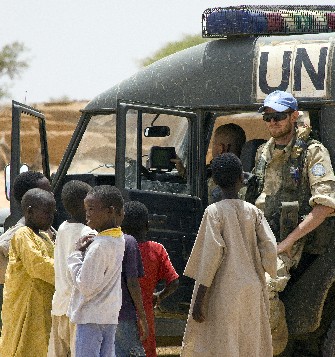|
Africa Politics "Africa left alone over Afghan war"
Chad and the Central African Republic are strongly affected by the war in the neighbouring Darfur provinces of Sudan. Not only have large numbers of Darfuri refugees streamed into their lands, but the conflict has also spilled over their borders, with armed groups and bandits creating a humanitarian crisis over vast areas.
No wonder, then, that the government of Chad now has asked the UN to withdraw the entire peacekeeping mission. The remaining troops, mostly poorly trained and equipped, could easily be replaced by Chadian troops, which would have ampler mandates to provide security. In the Democratic Republic of Congo (DRC), where the eastern provinces still experience the aftermaths of a greater war that has cost millions of lives, government and popular disappointment in the MONUC peacekeepers is not less. Also DRC authorities have now asked for a gradual withdrawal of MONUC. MONUC is the largest UN peacekeeping operation worldwide. Some 20,500 UN troops are stationed in the DRC, most being from Asian and African nations. MONUC has become increasingly poorly equipped and peacekeepers have been criticised for poor discipline and violating Congolese law. According to NUPI - which today organised an international conference discussing "whether the current mainstream peace-building approach is conceptually and structurally flawed" - much of the problems surrounding peacekeeping missions in Africa today stem from the withdrawal of Western support and engagement. "When UN peace operations mostly do not succeed properly, this is to a large degree due to their lack of essential equipment and staff," the NUPI researchers hold. And this equipment is mostly held by Western nations. Also, troops needed good skills to solve complicated peacekeeping tasks, and these skills were normally not held by the African and Asian troops now dominating UN forces, they claim. According to the researchers, the war in Afghanistan was now the main focus of Western countries, including Norway, leading to an even lower priority of African peacekeeping missions. Indeed, already last year, under the influence of the global finance crisis, many European countries strongly reduced their military activities abroad. While the engagement in Afghanistan was maintained, expensive overseas peacekeeping missions were strongly reduced. France, Poland, Germany, among others, withdrew troops from UN missions and have made no pledges to return as the economy is improving. In Europe and North America, there is a growing sense of leaving UN peacekeeping missions not part of the "war against terror" to African and Asian nations. In addition, the African Union (AU) is left to maintain its own peacekeeping missions. By staff writer © afrol News - Create an e-mail alert for Africa news - Create an e-mail alert for Politics news
On the Afrol News front page now
|
front page
| news
| countries
| archive
| currencies
| news alerts login
| about afrol News
| contact
| advertise
| español
©
afrol News.
Reproducing or buying afrol News' articles.
You can contact us at mail@afrol.com









